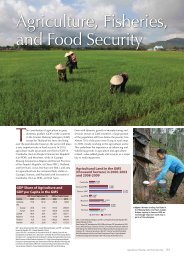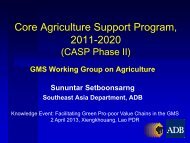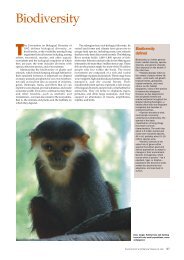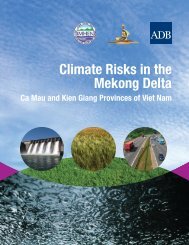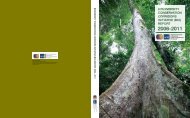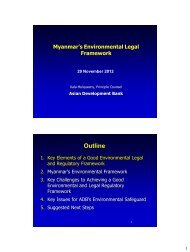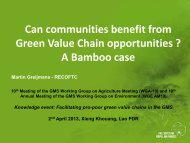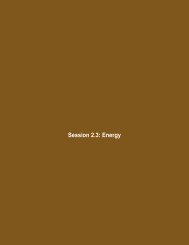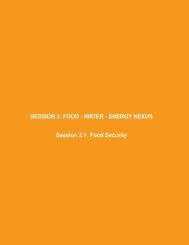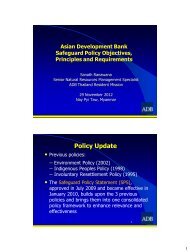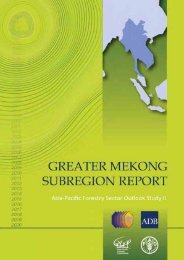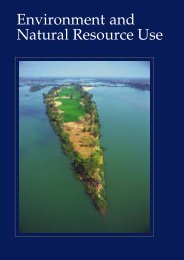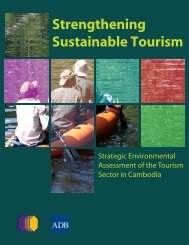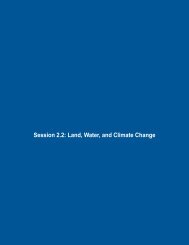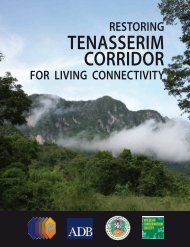Foreword and Conference Inauguration - GMS-EOC
Foreword and Conference Inauguration - GMS-EOC
Foreword and Conference Inauguration - GMS-EOC
Create successful ePaper yourself
Turn your PDF publications into a flip-book with our unique Google optimized e-Paper software.
InauGuRal speeCh<br />
by<br />
Mrs Mingquan Wichayarangsaridh<br />
Deputy Permanent Secretary<br />
Ministry of Natural Resources <strong>and</strong> Environment,<br />
Thail<strong>and</strong><br />
at<br />
Gms 2020 International <strong>Conference</strong>: Balancing<br />
economic Growth <strong>and</strong> environmental sustainability<br />
20 February 2012<br />
Royal Orchid Sheraton Hotel & Tower, Bangkok<br />
Swasdee Kha,<br />
Honorable Vice Minister Dr Parisak of Lao PDR,<br />
Your Excellencies from Cambodia, People’s Republic of<br />
China, Lao PDR, Myanmar <strong>and</strong> Viet Nam,<br />
Mr Stephen Groff, Vice President of the Asian Development<br />
Bank, distinguished guests, ladies <strong>and</strong> gentlemen.<br />
It gives me a great pleasure today to inaugurate the<br />
International <strong>Conference</strong> of the Greater Mekong Subregion<br />
– <strong>GMS</strong> 2020 on behalf of the Minister of Natural Resources<br />
<strong>and</strong> Environment who is now on other mission. Although he<br />
is unable to attend this conference, he sends his warmest<br />
greetings to us all <strong>and</strong> wishes this <strong>Conference</strong> a success.<br />
The timing of the <strong>GMS</strong> 2020 International <strong>Conference</strong> is<br />
indeed very appropriate after Thail<strong>and</strong> recovers from the<br />
devastating floods of 2011. The theme of the <strong>Conference</strong><br />
“Food-Water-Energy nexus” is highly relevant <strong>and</strong> critically<br />
important at this juncture of development <strong>and</strong> growth in the<br />
countries of the <strong>GMS</strong>.<br />
Excellencies,<br />
Ladies <strong>and</strong> gentlemen,<br />
Most developing countries enjoyed a relatively high level of<br />
economic growth over the last three decades accompanied<br />
by rapid industrialization, urbanization, <strong>and</strong> agricultural<br />
intensification. This growth relied extensively on the<br />
country’s abundant <strong>and</strong> diverse natural resources. It has<br />
led to the degradation of l<strong>and</strong> <strong>and</strong> water quality, caused the<br />
loss of natural habitats, <strong>and</strong> generated increasing levels<br />
of air <strong>and</strong> water pollution.<br />
The current trends of natural resources declining <strong>and</strong><br />
environmental degradation show that there are persistent<br />
implementation gaps, according to the commitments of<br />
the l<strong>and</strong>mark <strong>Conference</strong> of 1972, the Earth Summit in<br />
Inaugural Speech<br />
1992 <strong>and</strong> the World Summit on Sustainable Development<br />
in 2002. Many commitments made by the international<br />
community have not been fully met at the time when<br />
the world is still suffering from the repercussion of<br />
multiple crises. The <strong>GMS</strong> is more or less threaten by the<br />
aforementioned crises.<br />
However, since 1992, the six <strong>GMS</strong> countries; Cambodia,<br />
People’s Republic of China, Lao PDR, Myanmar, Thail<strong>and</strong>,<br />
<strong>and</strong> Viet Nam have agreed to work together on development<br />
of linked system of infrastructure <strong>and</strong> trade designed to<br />
support economic development goals. Moreover, the <strong>GMS</strong><br />
countries have a Strategic Development Framework (SDF)<br />
to cooperate in major areas, one of which is to protect<br />
the environment <strong>and</strong> promote sustainable use of shared<br />
natural resources.<br />
Excellencies,<br />
Ladies <strong>and</strong> gentlemen,<br />
In Thail<strong>and</strong>, more than three hundred villages face high<br />
flood risk each year; droughts, which occur annually can<br />
cause great damage to agriculture <strong>and</strong> industry. Nearly<br />
one third of the country’s l<strong>and</strong> area is classified as medium<br />
or high risk from drought. Of particular concern is water<br />
scarcity, which occurs against a backdrop of low availability,<br />
high pollution, <strong>and</strong> increased per capita consumption.<br />
Thail<strong>and</strong> has 25 river basins with 254 sub-basins.<br />
Rainwater is one of the most important sources of water.<br />
Data, however, suggests that Thail<strong>and</strong>’s per capita water<br />
resource is less than other countries in the region <strong>and</strong><br />
one third of it flows into the Mekong. The West basins<br />
have the largest storage capacity with the smallest total<br />
irrigation area. Existing water storage is about 37 percent<br />
of the annual runoff, on average, but in fact useable water<br />
is less. There is tremendous pressure on Thail<strong>and</strong>’s water<br />
resources.<br />
Excellencies,<br />
Ladies <strong>and</strong> gentlemen,<br />
Economic <strong>and</strong> population growth does not only increase<br />
dem<strong>and</strong> for water but also induces water pollution. Water<br />
dem<strong>and</strong> is expected to increase by 35% over the next<br />
two decades. It is estimated that an increase in Thail<strong>and</strong>’s<br />
population from 62 million in 2004 to 73 million by 2024<br />
would lead to an increase in average water dem<strong>and</strong> from<br />
the present 57,000 million cubic meters to 77,000 million<br />
cubic meters over the next two decades.<br />
5



